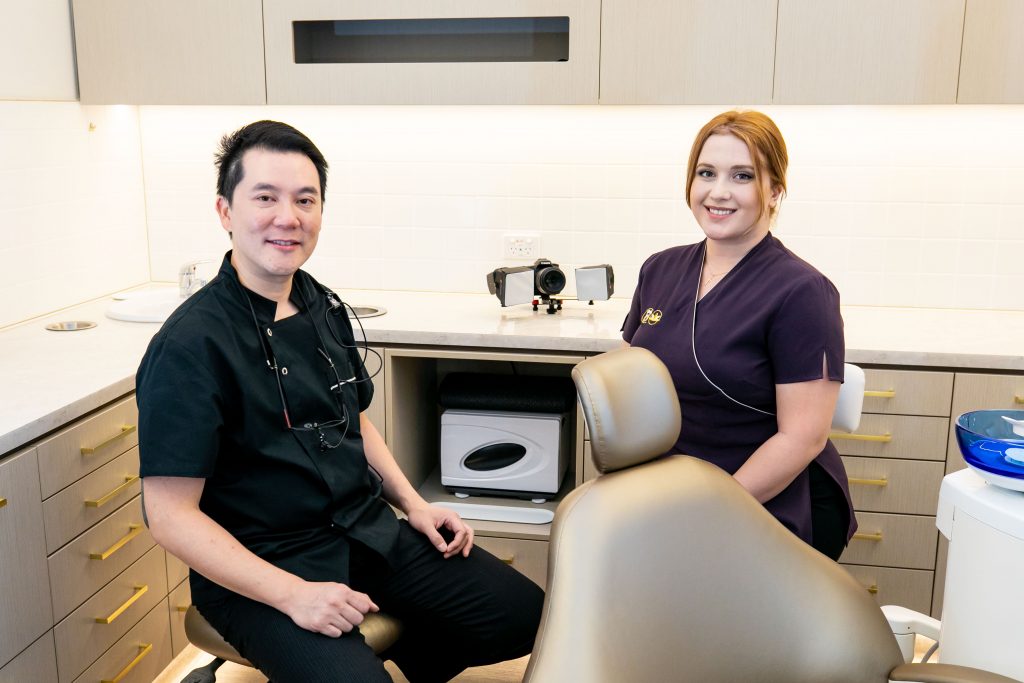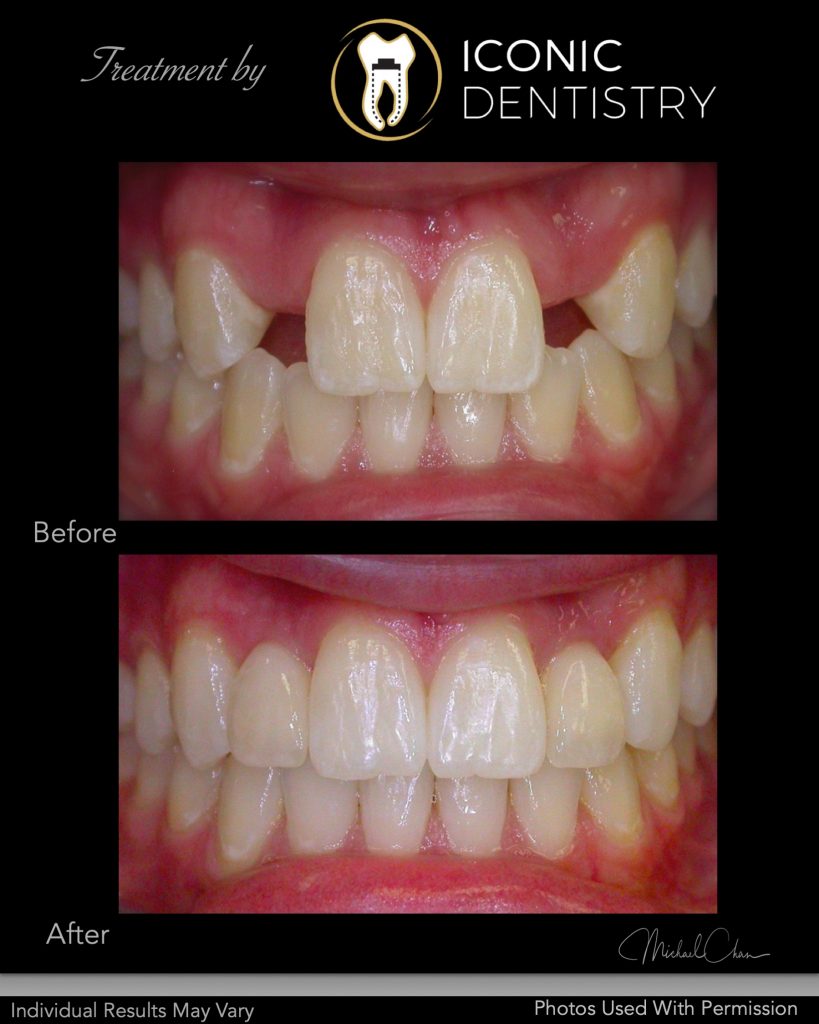Having missing teeth can impact the way you eat and speak, which can really knock your confidence. If you’ve lost teeth due to injury or dental disease and are considering dental implants, it’s important that you have all the information you need to make a decision about what you’d like to do. If you’re wondering about the various tooth replacement options available and want to make sure dental implants are suitable for you, our dentists at Iconic Dentistry will be happy to discuss this with you.

What are dental implants?
Your first question is likely to be: what are dental implants? They’re a discreet, long-term tooth replacement option that can be used to replace one or multiple missing teeth. Unlike dentures, which can easily be removed, or bridges, which are held in place by anchoring teeth on either side of the gap, dental implants are a complete tooth replacement which standalone without being attached to the neighbouring natural teeth. This means they look, feel and function just like your original teeth.
The benefits of dental implants
There are a number of aesthetic and functional benefits that come with having dental implants fitted at Iconic Dentistry. Compared to alternative tooth replacement options such as dentures, which can loosen or fall out when you talk, eat or laugh, dental implants allow you to enjoy life without worrying about your teeth. Some other benefits include:
- Dental implants are the next best thing to healthy, natural teeth
When you need a tooth replacement, biting and chewing can become difficult. Dental implants allow you to eat your favourite foods without pain or discomfort. They don’t rely on the strength of the neighbouring teeth to work. Since they look and feel like your real teeth, you can also brush and floss normally.
- Dental implants boost your confidence and self-esteem
Facial sagging is an unwanted but common side effect of missing teeth. Not only can dental implants dramatically restore your smile, but they prevent the deterioration of bone mass in the jawline that contributes to premature ageing.
- Dental implants protect your bite
The gap left by a missing tooth can cause adjacent teeth to shift out of position, and over time, this can affect your ability to bite and chew. The gap can also trap food and bacteria, potentially leading to gum disease later down the line.
Suitable candidates for dental implants
While dental implants are suitable for most people, there are certain lifestyle habits and health conditions that can affect your suitability — for example, if you smoke, have gum disease or illnesses that affect bone healing, or are under 18 years old. It’s important to come in for a consultation so that we can establish whether you are a suitable candidate for dental implants and potentially explore other tooth replacement options if necessary.
How dental implants are fitted
Dental implants act as the roots of your missing teeth. To create these artificial roots, small titanium metal posts are surgically placed into the jaw. Once they’re fitted, bone begins to grow around the titanium posts, fusing the dental implants permanently in place. This means they won’t slip or cause damage in the way that bridges or dentures might. Ceramic crowns are then fitted over the top of the implants, which become the teeth that you chew on. These are specially designed to match your other teeth in terms of style, shape and colour, so they blend in with your natural smile for a flawless result.
While the process of placing dental implants involves multiple stages and can take many months, much of that time is devoted to healing and bone growth. By the end of the process, you’ll walk away with a bright, beautiful smile and the newfound confidence to eat, speak and engage in social activities.
For dental implants, Perth patients trust Iconic Dentistry
Inserting dental implants is a complex and delicate procedure that involves multiple surgeries. To keep clinical risks to a minimum and achieve the best possible results, it should only be performed by a qualified and experienced dentist. When you are searching for ‘dental implants near me’, you need to know you’re in credible hands.
At Iconic Dentistry, we pride ourselves on offering the very highest standard of clinical care, delivered with exceptional customer service. When it comes to fitting dental implants, Perth patients have entrusted our multi-award-winning dentists with their smiles for decades, as you’ll see from our impressive before-and-after results.
From your initial consultation to your aftercare appointment, rest assured that you’ll be supported by our dedicated and knowledgeable practitioners every step of the way. To take the first steps towards transforming your smile, book an appointment today using our online tool or give us a call on 08 9474 3947.
FAQs
How long do dental implants last?
Providing you choose an experienced dental practitioner and take good care of your oral health, dental implants are very durable and can last a lifetime. Each titanium post is biocompatible, which means it is non-toxic and will not be rejected by your body. Once the posts fuse with the jawbone, dental implants become a part of you. The crowns over the top of the dental implants may eventually wear out like any other part of the body. These can simply be replaced as required.
Are dental implants painful?
You shouldn’t feel any pain during the surgical stage of having dental implants fitted because you’ll be under local anesthesia. You may feel some discomfort in the days that follow, along with tenderness and minor swelling, but this can be managed with ice packs, temporary avoidance of certain foods, and over-the-counter pain relief.
Can you eat nuts with dental implants?
We advise you to avoid crunchy hard foods after surgery while your body heals. Once your dental implants have healed in place, you are free to enjoy all your favourite foods. However, even after the initial recovery period, in order to maximise the lifespan of your dental implants, we would recommend that you take special care with nuts.
Can you get dental implants with gum disease?
Gum disease can cause the jawbone to shrink and gums to recede, so the active disease must be treated before tooth replacement for implant therapy to be successful. The more advanced or severe the periodontitis becomes, the less likely it is that dental implants will be considered a viable option.
Sometimes, after severe periodontitis, there may not be enough solid bone to support dental implants. In this instance, your dentist may be able to recommend a bone grafting or bone regeneration procedure. Otherwise, they may explore other tooth replacement options with you, such as dentures or bridges.

View Our Tooth Replacement Gallery Here
